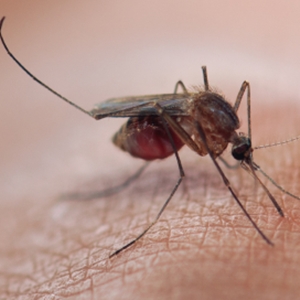
iStock
General precautions:
People who live in malaria-infested areas and people who travel to those areas must take precautions. It is especially important that South Africans recognise that large areas of our holiday terrain are still classified as malarious areas. The following are general preventative measures:
• use long-lasting insecticide sprays in homes and buildings
• place screens on doors and windows
• use mosquito netting over beds. Mosquito netting can be soaked in certain types of insecticide as well.
• apply mosquito repellents on the skin.
• wear sufficient clothing, particularly after sun- down, to protect as much of the skin as possible against mosquito bites. It is a rule of thumb that mosquitoes are less likely to land on white areas of clothing.
• Many people who live in malaria-infested areas sleep with strong fan currents in a room, which seems to discourage mosquitoes from feeding.
The above measures are at least as important as taking medicine to prevent malaria, since none of the medicines are 100 percent effective in preventing malaria.
Drugs to prevent malaria
Certain drugs can be taken to prevent malaria during travel to a malaria-infested area. If you are travelling to an area that is known to have malaria, it is important to take the drugs properly. Some drugs are:
• started a week beforehand
• continued throughout the stay
• extended for a month after leaving.
As mentioned before, remember that no drug therapy is completely effective in preventing the infection!
Chloroquine
This is the best drug to prevent malaria if someone is going to an area where the malarial parasites are not resistant to chloroquine, or if the rate of resistance is very low. Although chloroquine is still effective against P. vivax, P. malariae and P. ovale in almost all areas of the world, P. falciparum shows significant resistance to chloroquine in many areas of the world, including SE Asia, Central America and Africa. Chloroquine alone is not recommended for Southern Africa any longer.
Chloroquine is generally very safe, with few side effects at the doses used for prophylaxis of malaria. Side effects include headaches and dizziness, and can often be lessened by taking half a tablet twice a week rather than one tablet every week. It is also safe for children and pregnant women.
Chloroquine can be combined with a drug called proguanil to offer some protection against chloroquine resistant P. falciparum (especially in some areas of Africa), but proguanil needs to be taken daily, which makes it less convenient than some of the other options. The combination of cloroquine/proguanil, while offering some protection against chloroquine resistant malaria, is not the most effective regimen for prophylaxis.
Mefloquine (Lariam or Mefliam)
Mefloquine is very effective in preventing all forms of malaria in most parts of the world, but resistance has been reported in some areas of SE Asia. It is also taken weekly (like chloroquine). Mefloquine has unfortunately received bad publicity because of its neuropsychiatric side effects – such as hallucinations, seizures and anxiety. However, these reactions are very rare especially at the doses used for prophylaxis.
It is recommended that people who have known psychiatric problems or epilepsy should not take mefloquine. Some people recommend that people who need fine motor co-ordination should also not take mefloquine, but this recommendation is controversial. Mefloquine is generally considered to be the best alternative to chloroquine for preventing chloroquine resistant malaria.
Atovaquone/proguanil (Malarone)
This combination has been shown in various studies to be very effective in preventing malaria in areas were chloroquine resistance is a problem. The drug is taken daily, which is a potential problem (since people are more likely to forget the occasional dose), but it has the advantage that it only needs to be taken for one week after leaving the malaria area, unlike many other prophylactic drugs. Side effects are few, the most common being headache, abdominal pain and diarrhoea. One other major disadvantage at present is that this option is a lot more expensive than the other agents available for prophylaxis.
Doxycycline
Doxycycline can also be used to prevent malaria, and is particularly useful in areas where there is both chloroquine and mefloquine resistance, or for people who cannot take either of the other two drugs. Doxycycline needs to be taken daily, and can cause photosensitivity reactions. It should not be taken by pregnant women or by children less than about 10 years old, since it can interfere with growing teeth and bones.
Primaquine
This drug is normally used to treat the liver stages of P. vivax or P. ovale malaria. It has been advocated by some as a suitable drug for prophylaxis as well, and has been shown to be up to 95% effective in preventing both P. falciparum and P. vivax malaria. This drug also needs to be taken daily. As yet, it is not a widely accepted drug for malaria prophylaxis.
Tafenoquine
This drug is closely related to primaquine, the major difference being that it is much longer acting, and does not need to be taken daily. Studies have shown it to be effective in preventing malaria, although more work is probably necessary. However, it is an agent that may well be commonly used in the future.
One important side effect of both primaquine and tafenoquine is that they can cause rupture of red blood cells in certain susceptible individuals (people with a genetic predisposition), and this genetic risk would need to be screened for in a traveller before they could take the drug.
Before going to a malaria area, it is very important to get updated information on whether prophylaxis is required and what the current recommendations are. Consult either your doctor or pharmacist.
(Dr Andrew Whitelaw, MBBCh (Witwatersrand), MSc (UCT), FCPath (Micro) (SA) Pathologist, Department of Microbiology, University of Cape Town/National Laboratory Services)
People who live in malaria-infested areas and people who travel to those areas must take precautions. It is especially important that South Africans recognise that large areas of our holiday terrain are still classified as malarious areas. The following are general preventative measures:
• use long-lasting insecticide sprays in homes and buildings
• place screens on doors and windows
• use mosquito netting over beds. Mosquito netting can be soaked in certain types of insecticide as well.
• apply mosquito repellents on the skin.
• wear sufficient clothing, particularly after sun- down, to protect as much of the skin as possible against mosquito bites. It is a rule of thumb that mosquitoes are less likely to land on white areas of clothing.
• Many people who live in malaria-infested areas sleep with strong fan currents in a room, which seems to discourage mosquitoes from feeding.
The above measures are at least as important as taking medicine to prevent malaria, since none of the medicines are 100 percent effective in preventing malaria.
Drugs to prevent malaria
Certain drugs can be taken to prevent malaria during travel to a malaria-infested area. If you are travelling to an area that is known to have malaria, it is important to take the drugs properly. Some drugs are:
• started a week beforehand
• continued throughout the stay
• extended for a month after leaving.
As mentioned before, remember that no drug therapy is completely effective in preventing the infection!
Chloroquine
This is the best drug to prevent malaria if someone is going to an area where the malarial parasites are not resistant to chloroquine, or if the rate of resistance is very low. Although chloroquine is still effective against P. vivax, P. malariae and P. ovale in almost all areas of the world, P. falciparum shows significant resistance to chloroquine in many areas of the world, including SE Asia, Central America and Africa. Chloroquine alone is not recommended for Southern Africa any longer.
Chloroquine is generally very safe, with few side effects at the doses used for prophylaxis of malaria. Side effects include headaches and dizziness, and can often be lessened by taking half a tablet twice a week rather than one tablet every week. It is also safe for children and pregnant women.
Chloroquine can be combined with a drug called proguanil to offer some protection against chloroquine resistant P. falciparum (especially in some areas of Africa), but proguanil needs to be taken daily, which makes it less convenient than some of the other options. The combination of cloroquine/proguanil, while offering some protection against chloroquine resistant malaria, is not the most effective regimen for prophylaxis.
Mefloquine (Lariam or Mefliam)
Mefloquine is very effective in preventing all forms of malaria in most parts of the world, but resistance has been reported in some areas of SE Asia. It is also taken weekly (like chloroquine). Mefloquine has unfortunately received bad publicity because of its neuropsychiatric side effects – such as hallucinations, seizures and anxiety. However, these reactions are very rare especially at the doses used for prophylaxis.
It is recommended that people who have known psychiatric problems or epilepsy should not take mefloquine. Some people recommend that people who need fine motor co-ordination should also not take mefloquine, but this recommendation is controversial. Mefloquine is generally considered to be the best alternative to chloroquine for preventing chloroquine resistant malaria.
Atovaquone/proguanil (Malarone)
This combination has been shown in various studies to be very effective in preventing malaria in areas were chloroquine resistance is a problem. The drug is taken daily, which is a potential problem (since people are more likely to forget the occasional dose), but it has the advantage that it only needs to be taken for one week after leaving the malaria area, unlike many other prophylactic drugs. Side effects are few, the most common being headache, abdominal pain and diarrhoea. One other major disadvantage at present is that this option is a lot more expensive than the other agents available for prophylaxis.
Doxycycline
Doxycycline can also be used to prevent malaria, and is particularly useful in areas where there is both chloroquine and mefloquine resistance, or for people who cannot take either of the other two drugs. Doxycycline needs to be taken daily, and can cause photosensitivity reactions. It should not be taken by pregnant women or by children less than about 10 years old, since it can interfere with growing teeth and bones.
Primaquine
This drug is normally used to treat the liver stages of P. vivax or P. ovale malaria. It has been advocated by some as a suitable drug for prophylaxis as well, and has been shown to be up to 95% effective in preventing both P. falciparum and P. vivax malaria. This drug also needs to be taken daily. As yet, it is not a widely accepted drug for malaria prophylaxis.
Tafenoquine
This drug is closely related to primaquine, the major difference being that it is much longer acting, and does not need to be taken daily. Studies have shown it to be effective in preventing malaria, although more work is probably necessary. However, it is an agent that may well be commonly used in the future.
One important side effect of both primaquine and tafenoquine is that they can cause rupture of red blood cells in certain susceptible individuals (people with a genetic predisposition), and this genetic risk would need to be screened for in a traveller before they could take the drug.
Before going to a malaria area, it is very important to get updated information on whether prophylaxis is required and what the current recommendations are. Consult either your doctor or pharmacist.
(Dr Andrew Whitelaw, MBBCh (Witwatersrand), MSc (UCT), FCPath (Micro) (SA) Pathologist, Department of Microbiology, University of Cape Town/National Laboratory Services)




 Publications
Publications
 Partners
Partners
















